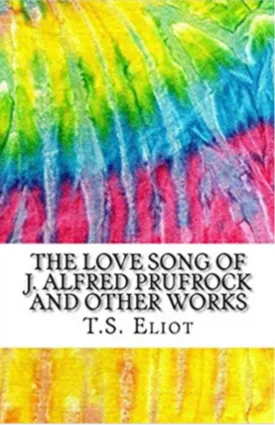The Love Song of J. Alfred Prufrock and Other Works by T. S. Eliot
T.S. Eliot was a groundbreaking and prolific American-born British poet who wrote extensively on the modern condition. He won the Nobel Prize for Literature in 1948, and his masterworks, “The Waste Land” and “Four Quartets” remain important works of modernism. One of his best-known works is “The Love Song of J. Alfred Prufrock,” which captures the anxiety and existential dread of the modern age within a captive monologue of a timid, isolated man.
Published in the June 1915 issue of the magazine Poetry, “The Love Song of J. Alfred Prufrock” set the tone for Eliot’s writing and showcased his prowess in scrutinizing the human condition. The poem, while presenting itself as a conventional love song, serves as a personal narrative of Prufrock’s personal struggle as an ordinary man in an extraordinary society. From the very beginning, Eliot submerges his reader into the monologue of a conflicted man who, despite being middle-aged, is gripped by indecision and insecurity. Prufrock is overwhelmed by societal expectations, but is unable to act on them out of fear and doubt. His narrative reflects the struggles of living through transformation and the impossibility of fitting into a fast-changing world.
The poem’s structure is a continuous stream-of-consciousness, outlining mundane activities of Prufrock’s time; such as going out to coffee shops, walking down city streets and preparation for events. Although his anxiety-riddled monologue contains fleeting moments of potential love and belonging, they remain unfulfilled. Eliot expertly captures the modern disillusionment of an isolated individual while invoking images of his city’s past – using the ancient Biblical references of the “Sea of Faith” in Constantinople. This memorable metaphor encapsulates Prufrock’s own spiritual distance and yearning for human connection.
The literary legacy of “The Love Song of J. Alfred Prufrock” is indelible, and the poem continues to be read in classrooms and anthologies. Eliot used its modernist style to redefine the English language, combining free-verse and classical meter in his experimental lyricism. This is also seen in “The Waste Land,” a much longer but equally powerful poem inspired by the modern condition and its effect on Europe during a time of drastic change. Eliot’s poignant satire takes the reader on a haunting, yet humorous journey of the modern age’s spiritual desolation, and traces an oral history from Western and Eastern culture.
Eliot’s poetry never lacks in passion nor insight as he captures moments of unexpected beauty among devastation and despair. “The Hollow Men” is a haunting poem which calls out the desolation of modern life, with its hopeless inhabitants crying out “Not with a bang, but a whimper.” His sketches of spiritual futility and the anxiety of solitude appear in some of his most beloved works, including “Rhapsody on a Windy Night” and “The Journey of the Magi.”
Eliot’s probing of the human experience and his boundary-breaking style made him one of the most influential modern poets. His works remain powerful, as perennial documents of the human condition and reflections of a period of profound change. “The Love Song of J. Alfred Prufrock” is a timeless, moving monologue about spiritual desolation and being unable to reconcile a changing world. Eliot encapsulated the modern spirit in his incisive words, but found ultimate comfort in the everlasting power of the written word.

